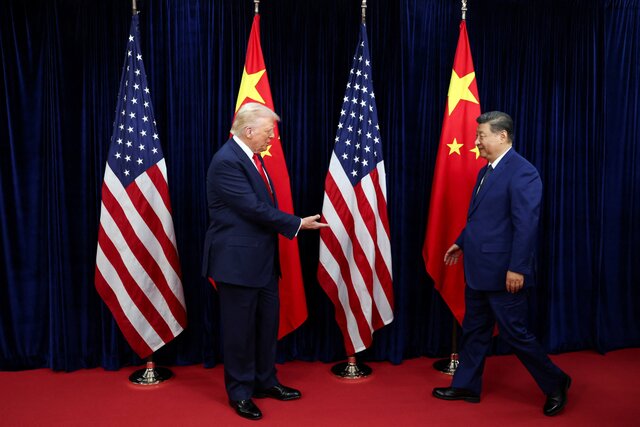‘Russia is a superpower of the past’. Meduza asks China expert Alexander Gabuev what Trump’s ‘12 out of 10’ meeting with Xi Jinping means for Putin
Manage episode 517002005 series 3381925

On October 30, U.S. President Donald Trump met with Chinese leader Xi Jinping for the first time in six years. Trump described the meeting, which came after a months-long trade war, as “amazing” and a “12 out of 10.” He also announced plans to immediately reduce tariffs on China from 57 to 47 percent, and claimed that Xi had agreed to postpone Beijing’s export restrictions on rare-earth materials. To learn more about Trump’s sudden U-turn in the trade war with China and what it could mean for Vladimir Putin’s Russia, Meduza spoke to China expert Alexander Gabuev, the director of the Carnegie Russia Eurasia Center in Berlin.
The following interview has been edited and abridged for length and clarity. You can read the full Q&A in Russian here.

— What did you expect from the meeting between Trump and Xi?
— Trump’s meeting with Xi was important because it was their first face-to-face contact since Trump’s re-election. There has been a lot of negativity building up due to the trade war between China and the United States. It started in April, but in fact, it was going on before then, given all the actions of the first Trump administration and the Biden administration. It was to be expected that the trade war would be paused at some point, at least temporarily. And that’s exactly what happened. But we don’t know how sustainable this truce will be.
Our only hope is you. Support Meduza before it’s too late.
— Trump said that the meeting was a “12 out of 10.” What actually happened?
— The meeting was quite short, just an hour and 40 minutes, with simultaneous translation. Obviously, this isn’t much time to delve into the agenda, given how vast it is. It’s clear that many very important aspects of the U.S.–China relationship weren’t touched upon at all. Trump and Xi focused on trade relations, restrictions and export controls on rare-earth metals and other critical minerals, and found a mutually acceptable solution.
Trump declares any decision he can credit himself with as epoch-making — hence the “12 out of 10” rating. His personal perception is what creates this positive emotional backdrop. In practice, there’s now a plateau in [U.S.–China] relations. However, this truce could be broken at any moment, and we [could] see a new round of escalation.
Putin and Xi’s last meeting
— Why did Trump, who has been systematically waging a trade war against China, change his approach so abruptly?
— Trump changed his approach because China demonstrated that it has counter-leverage: tools that can inflict pain on the United States. These are, first and foremost, export controls on critical minerals that American industry depends upon, including the military-industrial complex. Over the past year, China has demonstrated for the first time that it can use these export control measures successfully. This is what actually prompted Trump to retreat from his initially maximalist position.
— How will this meeting and Trump’s planned visit to China affect relations between Russia and China? Could Trump create a rift in the China–Russia partnership?
— Russia’s war against Ukraine has proved beneficial for China, allowing it to increase Russia’s dependence and make it an increasingly obedient junior partner. It also allows [China] to gain discounted access to Russian minerals and the latest developments in the Russian military industrial complex, as well as experience in drone warfare and all the modern innovations that are being tested on the battlefields in Ukraine. Yes, China is paying a price in the form of worsening relations with Europe, but it believes that these relations would have deteriorated in any case.
read more about drones
The U.S. isn’t offering anything fundamental to get China to abandon cooperation with Russia. The U.S. could offer long-term guarantees that it won’t hinder China’s technological development, or that it will stop restricting the export of high-tech U.S. products to China, or that it will allow China full entry into its markets, or that it won’t interfere in Beijing’s attempts to retake Taiwan by force. But so far, this hasn’t happened.
— In September, Vladimir Putin visited China and signed more than 20 partnership agreements, including a memorandum on building the Power of Siberia–2 gas pipeline. How important are these agreements, and will new joint projects be launched soon?
— Russia and China signed a fairly large package of documents, including framework agreements and memoranda that don’t stipulate contracts or concrete details. The memorandum on the Power of Siberia–2 is potentially the most important among them. But there is no clarity yet —the negotiations are ongoing.
The Russia–China partnership does not necessarily mean there is no friction between them. Many of the agreements that Russia would like to reach with China — for example, on building the Power of Siberia–2 gas pipeline — don’t serve China’s interests in their current form. Like any buyer, China wants to pay less for Russian gas, have minimal purchase obligations, and have maximum flexibility. Like any seller, Russia wants to sell at a higher price and have guaranteed sales. As such, Moscow and Beijing have been butting heads over these two conditions — the price of gas and the mandatory purchase volume — for several years now, and they continue to do so. Moreover, China has the greater negotiating leverage, not Russia.
China is undoubtedly Russia’s biggest trading partner for the foreseeable future (unless, of course, relations with the European Union are ever restored). Therefore, there will always be disputes and friction here — it’s completely natural.
read more about the pipeline
— China has been actively expanding its influence in Central Asia, a region that Russia traditionally considers part of its “sphere of influence.” Is there potential for a conflict with Russia here?
— Competition for influence in neighboring regions, such as Central Asia, is completely natural for China. China is a major trade, technology, and investment partner of all five Central Asian countries. The static situation where Central Asia was considered a region exclusively under Russia’s geopolitical influence has also long passed. Countries in the region are trying to diversify their relations and are interested in putting their eggs in different baskets, including China’s. A conflict between Russia and China is nevertheless unlikely. But there will definitely be competition.
— How will China develop its relationships with the U.S. and Russia in the future? What are its goals?
— The U.S. is now China’s only competitor on the global stage. Russia is, of course, a superpower of the past. Yes, it’s still a country with a major nuclear arsenal, powerful armed forces, its own defense industry, and the ability to endure hardships. But nevertheless, in terms of combined power, scientific, technological, and military potential, and the size of their economies, China and the U.S. are in a completely different league than Russia.
Therefore, the main priority for China is building relations with the United States. I don’t think China is seeking to replace the U.S. as the undisputed leader of the entire world, which the U.S. tried to be after the end of the Cold War. However, it’s certainly striving to be the leader in Asia and its immediate geographic neighborhood, which includes Russia. Therefore, China will continue to dictate its will and terms to others, thereby creating the most favorable conditions for its own development.
65 episodes



